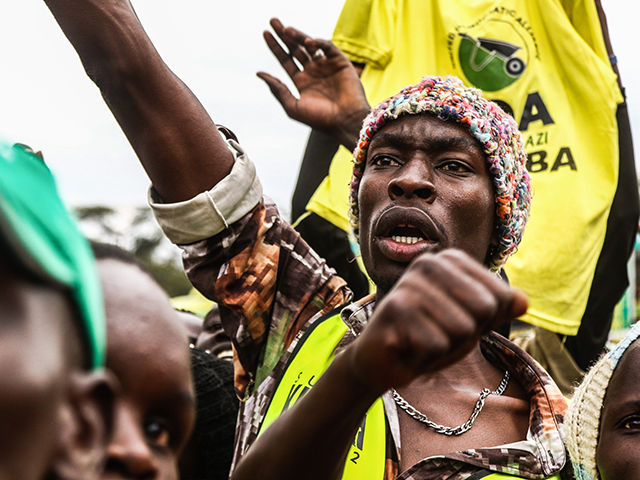A Kenyan government agency threatened Facebook with a suspension last week if it did not promptly remove advertisements intentionally submitted by a third party to test Facebook’s adherence to anti-Kenyan hate speech laws ahead of a general election on August 9, though Kenyan government ministers said on Monday that such a suspension would not occur, Voice of America (VOA) reported.
Kenya’s National Cohesion and Integration Commission (NCIC) issued a warning to the U.S.-based tech company Meta, which owns the social media platform Facebook, on July 29 saying the company had seven days to “tackle hate speech and incitement on the platform” relating to Kenya’s upcoming election, “failing which its operations will be suspended,” Reuters reported at the time.
“The NCIC has held talks with the Communications Authority of Kenya (CAK), which regulates social media firms, and it will recommend the suspension of Meta’s operations,” NCIC commissioner Danvas Makori said on July 29.
Makori accused Facebook of violating hate speech laws in Kenya in addition to its constitution by allowing certain advertisements to run on its local pages, citing the findings of an investigation by the advocacy group Global Witness.
Kenyan Ministers Say Government Not Banning Facebookhttps://t.co/MIakX0Zffj
— Voice of America (@VOANews) August 2, 2022
“We decided to test Facebook’s ability to detect hate speech ahead of the Kenyan elections, sourcing ten real-life examples of hate speech used in Kenya since 2007 and submitting them for approval. In total we submitted twenty ads to Facebook, which covered the ten real-life hate speech examples and their corresponding translation in English or Swahili,” Global Watch wrote on July 28.
“After making minor grammar changes and removing several profane words, Facebook approved the ads even though they contained clear hate speech,” according to the organization.
“All of the ads we submitted violate Facebook’s Community Standards, qualifying as hate speech and ethnic-based calls to violence. Much of the speech was dehumanising, comparing specific tribal groups to animals and calling for rape, slaughter and beheading. We are deliberately not repeating the phrases used here as they are highly offensive,” Global Watch stated.
NEW | Ahead of elections in Kenya which are expected to be tightly contested, we tested Facebook's ability to detect hate speech.
Once again, despite claims to act on hateful content, @Meta failed miserably.
New from #GWTech & @Foxglovelegal: https://t.co/OxfTNiHcVP@Odangaring pic.twitter.com/RNypXqTyHJ
— Global Witness (@Global_Witness) July 28, 2022
Kenyan Interior Cabinet Secretary Fred Matiangi said the NCIC had made “a careless decision on the matter,” when asked about the issue on August 1.
“He assured the public that the platform [Facebook] would not be shut down,” VOA relayed.
Kenyan Information and Technology Minister Joe Mucheru seconded Matiangi’s remarks in a telephone interview with VOA on Monday.
“He said while the issues raised were valid, they did not warrant blocking Facebook,” the U.S. government-funded broadcaster relayed.
“That is not within our legal mandate, and we have been working with Facebook and many other platforms,” Muchera clarified.
“Facebook for example has in this electioneering period has deleted over 37,000 inflammatory comments [sic],” he noted.
Reuters on July 29 described the NCIC as an “ethnic cohesion watchdog” that aims to “foster ethnic harmony among Kenya’s 45 tribes, some of which have targeted each other during violence in past polls.”
The NCIC was apparently worried that the Facebook advertisements in question could possibly stoke ethnic tensions ahead of or during Kenya’s presidential, legislative, and local elections on August 9.
The Mozilla Foundation on June 8 published a report in which it said it had identified “130 TikTok videos that pushed ‘widespread disinformation’ and stoked ‘violent, ethnic discriminatory narratives,’” Al Jazeera reported on June 10.
TikTok’s parent company, Bytedance, is a Beijing-based technology company. The Washington Post reported in August 2021 that China’s central government had recently “taken an ownership stake in a subsidiary that controls the domestic Chinese social media and information platforms of ByteDance.”
Kenyan law does not explicitly define “hate speech,” though Article 33 of the Kenyan constitution prohibits “hate speech; or advocacy of hatred that— constitutes ethnic incitement, vilification of others or incitement to cause harm; or is based on any ground of discrimination specified or contemplated in Article 27.”

COMMENTS
Please let us know if you're having issues with commenting.